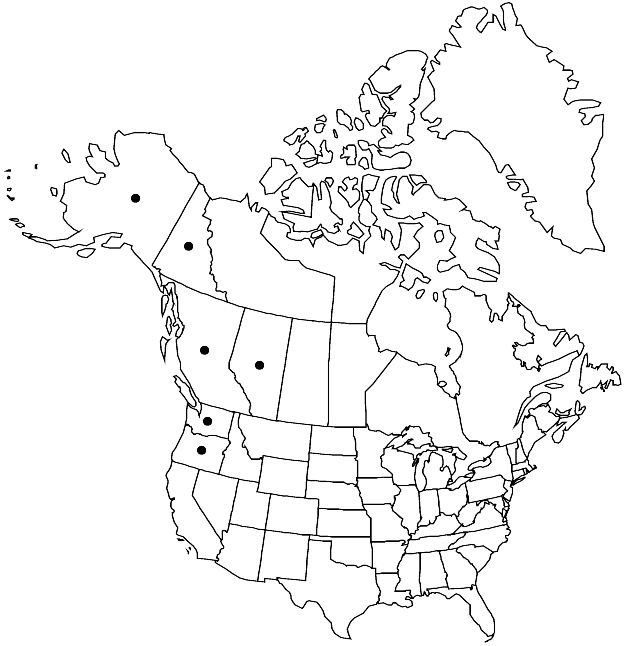Draba stenoloba
Fl. Ross. 1: 154. 1841.
Biennials or perennials; (short-lived, not cespitose); caudex simple (not fleshy); scapose. Stems often unbranched, (0.2–)0.4–3(–3.4) dm, pubescent proximally, usually glabrous distally, rarely sparsely pubescent, trichomes short-stalked, 2–4-rayed, 0.1–0.4(–0.5) mm. Basal leaves rosulate; petiole (obscure), margin ciliate, (trichomes simple, 0.2–0.4 mm); blade oblanceolate to obovate, 0.4–2.6(–3.1) cm × 1.5–7(–10) mm, margins entire or denticulate, (ciliate as petiole), surfaces pubescent, abaxially with short-stalked, 3- or 4-rayed trichomes, 0.1–0.5 mm, adaxially with simple and stalked, 2–4-rayed trichomes, 0.1–0.5 mm. Cauline leaves (0 or) 1 or 2 (3 or 4); sessile; blade elliptic to lanceolate or ovate, margins toothed, surfaces pubescent, abaxially with short-stalked 3- or 4-rayed trichomes, adaxially with simple and short-stalked, 2–4-rayed trichomes. Racemes (2–)4–10(–15)-flowered, ebracteate, elongated in fruit; rachis not flexuous, usually glabrous, rarely sparsely pubescent. Fruiting pedicels horizontal to divaricate-ascending, straight, 3–14(–19) mm (subequaling or shorter than fruit), usually glabrous, rarely pubescent, trichomes 2–4-rayed. Flowers (chasmogamous, petaliferous); sepals (green or purplish), oblong, 1.5–2.5 mm, glabrous or pubescent, (trichomes simple); petals yellow, oblanceolate, 2.5–3.5 × 0.6–1 mm; anthers ovate, 0.25–0.4 mm. Fruits linear or, rarely, linear-elliptic, plane, flattened, (8–)10–17(–20) × 1.5–2 mm; valves usually glabrous, rarely sparsely puberulent, trichomes simple; ovules 24–36 per ovary; style 0.01–0.15 mm. Seeds ovoid, 0.9–1 × 0.5–0.6 mm. 2n = 40.
Phenology: Flowering Jun–Jul.
Habitat: Grassy knolls, glacial moraines and creek banks, mesic meadows, alpine thickets
Elevation: 600-2300 m
Distribution

Alta., B.C., Yukon, Alaska, Oreg., Wash.
Discussion
Draba stenoloba is occasionally confused with D. albertina, but is easily recognized by having exclusively 2–4-rayed (versus mostly simple) trichomes on stems proximally. It is rarely encountered and apparently confined to the Pacific Northwest. In contrast, D. albertina is common and widespread in the mountains of western North America.
Selected References
None.